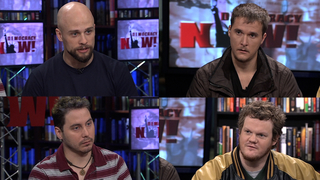
Guests
- Akash Goelone of the co-creators of the “Not a Bug Splat” project. He is a practicing physician at Columbia University – New York Presbyterian Hospital.
In an act of protest against drone attacks, a group of artists and villagers have unveiled a giant banner on a Pakistani field featuring the face of a young child. Organizers say the child lost her parents and two young siblings in a U.S. drone strike. Her picture is large enough to be picked up by satellite imagery. The “Not a Bug Splat” campaign is the work of Pakistanis, Americans and the French street artist JR. The project derives its name from a piece of military software that generates computer models of the destruction a bombing raid might cause — those models reportedly resemble the remains of a squashed insect on a windshield. Now, drone operators will see the face of the little girl staring up at them instead. We speak with Dr. Akash Goel, a physician who is one of the co-creators of the “Not a Bug Splat” project.
Transcript
JUAN GONZÁLEZ: In an act of protest against drone attacks in Pakistan, a group of artists and villagers have unveiled a giant banner of a young child on a field in a heavily bombed region. Organizers say the child lost her parents and two young siblings in a U.S. drone strike. Her picture is large enough to be picked up by satellite imagery.
AMY GOODMAN: We’re joined right now by Akash Goel. He is one of the co-creators of “Not a Bug Splat” project. He’s also a practicing physician at Columbia University, New York Presbyterian Hospital. He used to work at the William J. Clinton Foundation.
Welcome to Democracy Now! Explain what this is and why you, a doctor practicing here in New York City, are involved with this vast banner that can be seen from the heavens.
DR. AKASH GOEL: Thanks for having me on the show. Well, I think we were very concerned about kind of how dehumanizing this war by remote control is, to begin with. I think when we heard about kind of the language and the lexicon with which it was used, “bug splat,” we were kind of appalled by the insensitivity of the issue.
AMY GOODMAN: Explain. Who used that?
DR. AKASH GOEL: So, basically, “bug splat” refers to a kind of a computer generation of the effects of a bombing, and that includes collateral damage, and which is often civilian life. And so, we basically wanted to bring a sensitivity and an awareness, basically, to the civilian casualties at stake.
JUAN GONZÁLEZ: And how did you get the banner out there?
DR. AKASH GOEL: So, it was basically printed. It’s about 100-by-70 feet. It’s on vinyl, and it was basically rolled out, printed and rolled out and installed by villagers in the KPK region in western Pakistan.
AMY GOODMAN: And the girl who is pictured there?
DR. AKASH GOEL: Yeah, so she was actually subject to a bombing in 2009. She lost both of her parents and a sibling. So she’s a survivor. And, you know, we wanted this to kind of be a hopeful project, so we wanted to show a survivor, and—
AMY GOODMAN: And the response?
DR. AKASH GOEL: The response has been overwhelmingly positive. I think we’ve spoken to the hearts and minds of people around the world. I think, you know, everyone is sort of standing with us. And hopefully this will lead to some policy change.
AMY GOODMAN: You are Pakistani-American?
DR. AKASH GOEL: I’m actually Indian-American.
AMY GOODMAN: Indian-American.
DR. AKASH GOEL: I view this as being a global human rights project. It’s not a Pakistani rights project or regional human rights project. I think everybody has something at stake here.
AMY GOODMAN: Well, Akash Goel, I want to thank you very much for being with us. We will link to the Not a Bug Splat project.












Media Options